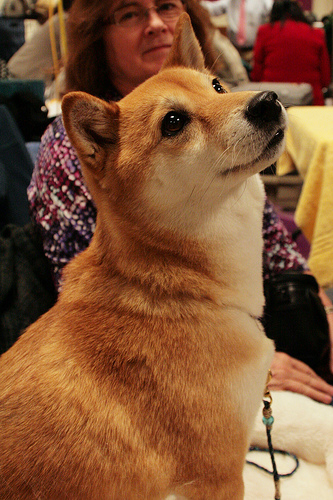Shiba Inu

Image by Llima
The smallest of the Japanese native breeds, the Shiba was originally developed for hunting in the dense undergrowth of Japan’s mountainous areas. Alert and agile with keen senses, he is also an excellent watchdog and companion. His frame is compact with well-developed muscles and he possesses a double coat that can be black and tan, red or red sesame.
Descended from the primitive dogs of the ancient people of Japan, the Shiba Inu was bred to hunt small wild game, boar and bear. The name Shiba in Japanese means brushwood, after the breed’s hunting terrain or the color of brushwood leaves in the fall and Inu means dog. World War II nearly spelled disaster for the Shiba due to bombing raids and distemper, but after the war, bloodlines were combined to produce the breed as it is known today.
The Shiba has an independent nature and can be reserved toward strangers but is loyal and affectionate to those who earn his respect. The Shiba adapts well to different living situations, but must be exercised regularly on leash or in a secure area. Early obedience training and regular brushing are musts.
– info taken from the American Kennel Club website
What is Socialization?
This is the term used to describe the process where puppies become familiar with the animals they interact with as they grow up e.g. people, other dogs, cats etc. So ensure your puppy meets as many people, of all ages as possible.
In pack society, this is also the period in which a puppy learns its position within the group and the social rules it must abide by Its mother.
Litter makes and other pack members all contributeto this learning. families who obtain a puppy must continue the process if the puppy is to have the best chance of being socially well adjusted.
Here is a helpful tip:
Daily examination of your puppy’s teeth, ears and paws and the area around his tail will condition him to accept this form of contact and help prevent fearful behaviour when visiting your veterinary surgeon, additionally treatment of any minor injury will be easier to achieve.
But socialisation with other dogs does not imply that allowing a puppy to run amuck with other dogs is a useful exercize. if allowed to happen without supervision a lack of general control is likely to develop whenever dogs are in the vicinity. increasingly, special puppy classes are available where puppies can socialise and learn control as soon as all inoculations have been given, normally 3 months. your veterinary surgeon will be able to advise you on classes in your locality. Even if you have to travel, it is an investment you will never regret. you must start before your puppy is 4 and half months old to gain the full benefit.
You might need to know, what is habituation?
This is the term used to describe a puppy’s familiarisation with the enviroment e.g.
traffic, crowds, car travel, loud noises etc.
The Sooner your puppy is exposed to enviromental stimuli the more likely he is to be able to cope, preventing the chance of fearful behaviour. Every effort should be made to do this systematically so that he becomes as bomb proof as possible by ensuring he develops pleasant association with his surrounding,
We can make comparison between INOCULATIONS VS SOCIALISATION/HABITUATION
Unfortunately most of the period of time critical to a puppy’s early development is also critical to the inoculation programmes that protect it from parvo virus, hepatitis, Lepto-spirosis and distemper. During this time it is normally considered that a puppy should not be allowed out of the house and garden which is detrimental to habituation because of the consequent lack of experience.
But is there a compromise?
Yes because of 4 things
1. There are inoculation programmes that can start earlier than what has become the traditional norm.
2. You must discuss this with your veterinary surgeonas soon as you get your puppy. programmes vary because some breeds are more susceptible than others and some areas can have a higher risk factor than others.
3. This sort of inoculation programme is likely to be more expensive than normal but worth every penny.
4. In addition to1, carrying your puppy helps to reduce his exposure to sources of infection. wrap him in a blanket so that if he does have toileting ‘accident’ there should be no need to put he does have a toileting there should be no need to put him down untill you get home or back to your car.
